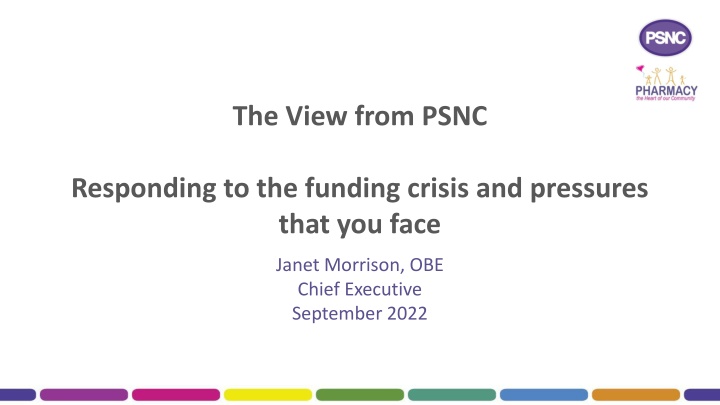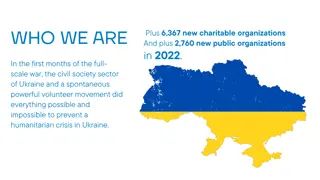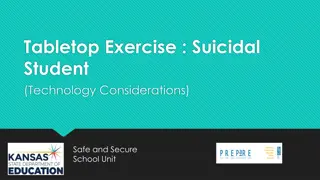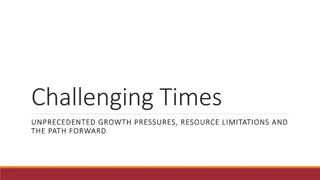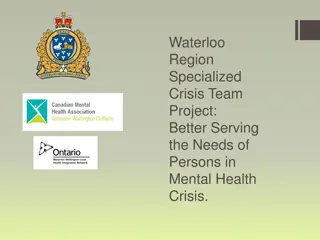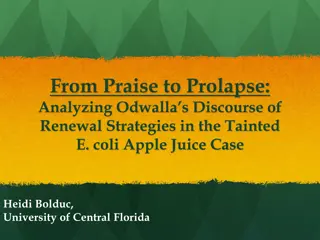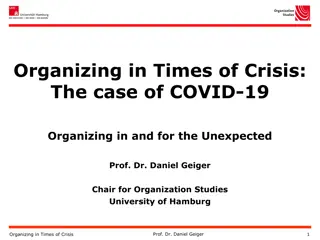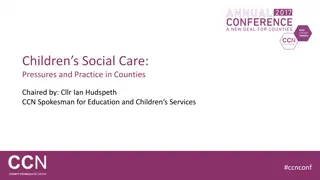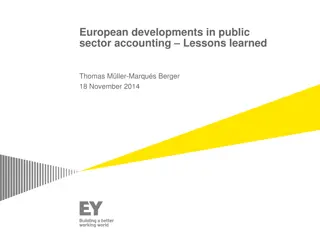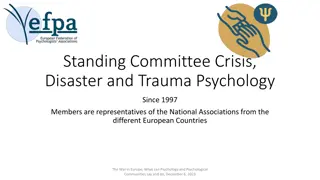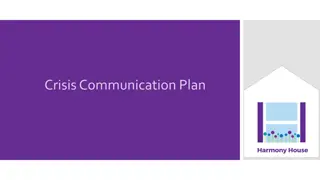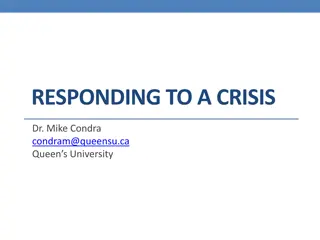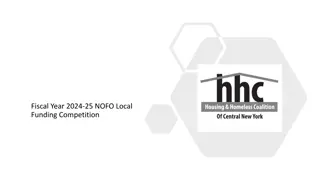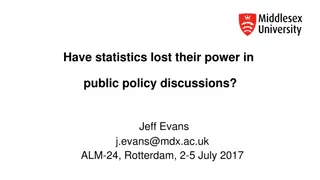Responding to Funding Crisis and Sector Pressures
Pressure is mounting in the sector due to workforce shortages, financial squeeze, and increased demand for services. Goals include seeking short-term relief, promoting community pharmacies as a solution, and preventing deflection of demand from GPs without additional funding. Strategies involve influencing and media activities to actively represent sector interests.
Download Presentation

Please find below an Image/Link to download the presentation.
The content on the website is provided AS IS for your information and personal use only. It may not be sold, licensed, or shared on other websites without obtaining consent from the author.If you encounter any issues during the download, it is possible that the publisher has removed the file from their server.
You are allowed to download the files provided on this website for personal or commercial use, subject to the condition that they are used lawfully. All files are the property of their respective owners.
The content on the website is provided AS IS for your information and personal use only. It may not be sold, licensed, or shared on other websites without obtaining consent from the author.
E N D
Presentation Transcript
The View from PSNC Responding to the funding crisis and pressures that you face Janet Morrison, OBE Chief Executive September 2022
Pressure in the sector is building to breaking point Pressures are being felt in every sector of the economy from households to the public and private sectors we are one of many sectors adversely affected This year s negotiations were very tough despite us putting together compelling evidence on pressures, capacity and a significant funding bid, whilst making a strong case for a funded Walk-In Service (which we know Ministers wanted) Whatever deal we have managed to attain it will not go far enough to alleviate the pain in the sector this has only been made worse by worsening conditions since it was agreed, predictions of inflation and energy bills since, with the hiatus caused by Ministerial resignations and political developments over the summer We recognise the funding crisis and that the pressures contractors and pharmacy teams are facing are at breaking point
Key drivers Workforce shortages and rising staff costs Financial squeeze and the impact of inflation and energy bills Increased demand for advice (as patients are diverted from GPs) which is not being paid for Capacity constraints and limited ability to make operational efficiencies Concessions/Drug tariff the gap between manufacturer and wholesale pricing and HM Government s need to regulate costs is passing on additional costs to CPs
Our Goals Seek short term relief and additional crisis funding similar to COVID funds Continue to promote CP s as a solution to NHS challenges and particularly GP access which Liz Truss has identified as one of her top 3 priorities Build on the contribution of the sector during the pandemic but with proper funding Prevent any further deflection of demand from GPs without additional funding Continue with medium- and long-term options to re-think the CPCS and deliver reform This will be underpinned by influencing and media activity to be seen to be actively representing their interests
Our short-term objective should be to continue to seek additional resources and relief for the funding crisis Seize the opportunity to influence the new PM, SofS and Ministers CP as part of the solution for NHS access, currently frustrated by capacity and funding constraints willing and able to take on major new services eg. Pharmacy 1st only if properly funded Influencing strategy to engage with wider stakeholders and parliamentarians & patient groups those that influence decision-makers And seek short term measures/rescue packages: Re-direction of current primary care pots Regulatory easing/relaxation on opening hours etc Business concessions/caps on utility bills Workforce pressures/costs Rate relief ..
Some are calling for more militant options for contractors which symbolically demonstrate CP s value We are increasingly being contacted by contractors about more militant action such as: Re-direct patients to GPs via comms/posters etc Work to rule Stop services e.g. deliveries Strikes But these options also carry risks in terms of patient acceptability and competition and may be drowned out by strikes and closures in other sectors
Medium term options Pursue promised efficiency reforms which are yet to be delivered and could create headroom for contractors: Supervision; skill mix plus use of independent prescribers; Original Pack Dispensing Economic review to establish real cost/benefit of services needs to be meaningful Investigate alternative models for tariff and concessions Explore options for developing models for local commissioning and funding from outside of the CPCF Supporting contractors to make changes
Our long term goal A complete re-think of the CPCF and of CP itself as part of Primary Care Re-framing CP as a solution to a key policy challenge access to NHS services and the nation s long-term health To do this we need to frame CP as a solution for the NHS that is being frustrated by funding and capacity constraints Articulating a new strategic vision shared with NHSE and DHSC And a fundamental re-think of how we are funded and can plan for future sustainability Underpinned by a wider stakeholder engagement and influencing strategy This is critical long-term work, as well as reforms to PSNC and LPCs and is in progress as part of the TAPR work programme
PSNCs Transforming Pharmacy Representation (TAPR) Programme Update for Contractors and LPCs September 2022
What is the TAPR Programme? PSNC met in the summer and considered the contractor vote result on the RSG proposals, about the future of LPCs and PSNC Given the clear mandate, the Committee agreed to take forward all of the 21 RSG proposals for PSNC, and to work with LPCs on the joint proposals It is being taken forward as a distinct programme of work to ensure PSNC remains focussed on the big issues facing contractors Taken together, all the work to implement the RSG Proposals is being called the Transforming Pharmacy Representation (TAPR) Programme
TAPR: Eight key workstreams 1. Vision and Strategy 2. Influencing and Negotiation 3. Governance 4. Finance and Levy 5. LPC Support 6. Engagement and Joint Working 7. Branding and Visual Awareness 8. Communications (to support all other Workstreams)
TAPR: Eight key workstreams 1. Vision and Strategy This will cover the development of a new shared vision for community pharmacies which can be used to inform wider pharmacy influencing work as well as PSNC s future negotiations on the CPCF. This is particularly important given that the end of the current five-year deal is approaching in April 2024. 2. Influencing and Negotiation This is the work needed to strengthen PSNC s negotiating capacity- including allowing for more evidence gathering and to influence effectively ahead of the next round of CPCF negotiations.
TAPR: Eight key workstreams 3. Governance The RSG made wide-reaching proposals to strengthen governance at PSNC and the LPCs, and this workstream will see a governance review at PSNC to address these. Points to be addressed include Committee size, the ability to hear from wider groups of contractors, and the accountability of PSNC to contractors. 4. Finance and Levy The RSG proposed a redirection of a greater proportion of contractor levies towards national work, so new LPC levies need to be calculated as one of the highest priorities. 5. LPC Support PSNC has committed to the production of a toolkit to support LPCs to consider the proposed changes for them, and will also work with LPCs on the joint proposals. LPC support will also be embedded within the transformed Community Pharmacy England.
TAPR: Eight key workstreams 6. Engagement and Joint Working The RSG made proposals for how PSNC should improve engagement with contractors, as well as giving them more oversight of PSNC and its activities and decisions. This workstream will explore that, as well the ongoing relationship with LPCs including through the proposed LPC Forum, and wider joint working across the sector. 7. Branding and Visual Awareness This workstream will explore work to rename (and rebrand) PSNC as Community Pharmacy England. PSNC agreed to take this forward at its July meeting. 8. Communications The communications workstream will support all other workstreams within the TAPR Programme. This will include issuing regular updates to contractors, engaging with wider stakeholders, and reporting progress on the Programme via status reports using a traffic-light system.
TAPR: Work so far July August 2022 Over the last few weeks, we have been engaging with stakeholders and LPCs to more clearly understand what they intend to do, the consequences of changes, and what support we can offer by sharing best practice and learnings from other areas. Progress has included: PSNC Committee has met twice to guide this work; Allocation of PSNC reserves to fund 2022/23 workplan; Publication of the programme overview and creation of a dedicated point of contact; Seeking initial views of LPCs on the revisions to the model constitution; Establishing a working group of LPC chairs, members, chief officers and others to oversee the creation of a LPC transformation toolkit; Discussing potential changes to funding of PSNC (levy) with the joint PSNC/LPC operations team; and Work with the NPA and CCA LPC support teams.
TAPR: Key dates Late September - December 2022 Publication of a detailed programme plan through to 2024, detailing the 8 workstreams, and inputs required from LPCs and others. LPC Conference to consider funding of PSNC and LPCs and the model constitution Implementation of transformation toolkit by LPCs including discussions between LPCs at a regional level. Work to begin sector-wide vision, strategy and investment in strategic influencing and development of our negotiating approach January March 2023 Planning for next phase of work beginning in April 2023, requiring LPC input: Design and launch of the national forum of LPC representatives Development of the Chief Officer network and provider company network
Questions and discussion chiefexec@psnc.org.uk
